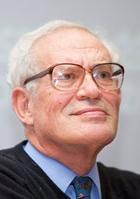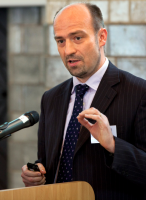 Professor Taufiq Choudhry is Professor of Finance, at the Southampton Business School, University of Southampton. He has taught extensively in Europe, Asia and the USA. His research interests include the effect of financial crises, political crises and news on the financial risk of investment and stock markets, as well as effects of exchange rate volatility on international trade.
Professor Taufiq Choudhry is Professor of Finance, at the Southampton Business School, University of Southampton. He has taught extensively in Europe, Asia and the USA. His research interests include the effect of financial crises, political crises and news on the financial risk of investment and stock markets, as well as effects of exchange rate volatility on international trade.
 Prof. Charles Goodhart is Director of the Financial Regulation Research Programme at the LSE. He is the originator of “Goodhart’s law”, an economic law and a legendary figure in world monetary economics. He served at the Bank of England for many years and was founding member of its Monetary Policy Committee from June 1997 to May 2000. He has published extensively in high-ranking economics journals. He is considered one of the world’s top monetary policy experts.
Prof. Charles Goodhart is Director of the Financial Regulation Research Programme at the LSE. He is the originator of “Goodhart’s law”, an economic law and a legendary figure in world monetary economics. He served at the Bank of England for many years and was founding member of its Monetary Policy Committee from June 1997 to May 2000. He has published extensively in high-ranking economics journals. He is considered one of the world’s top monetary policy experts.
 Dr. James Forder is the Andrew Graham Fellow and Tutor in Political Economy at Balliol College, Oxford and Executive Vice-Master of the College. Dr Forder is a known expert in the history of economics in the 20th century, on central bank independence, the economics of European integration and the political economy of European Monetary Union. As Vice-Master (Executive), Dr Forder is a source of advice to Balliol College on its budgetary position, and, in particular, on its non-academic income and expenditure.
Dr. James Forder is the Andrew Graham Fellow and Tutor in Political Economy at Balliol College, Oxford and Executive Vice-Master of the College. Dr Forder is a known expert in the history of economics in the 20th century, on central bank independence, the economics of European integration and the political economy of European Monetary Union. As Vice-Master (Executive), Dr Forder is a source of advice to Balliol College on its budgetary position, and, in particular, on its non-academic income and expenditure.
 Dr. Kang-Soek Lee, Ph.D. in economics from the University of Orléans, holds the French national qualification as Associate Professor of Economics at national universities. Currently candidate for Habilitation, he is a tenured Research Professor at the Paris Chamber of Commerce and Industry, the founding institution of HEC and ESCP. He has taught international finance and applied econometrics in France since 2004. His research interest focuses on econometric analyses of dynamics in exchange rates movement and international financial markets.
Dr. Kang-Soek Lee, Ph.D. in economics from the University of Orléans, holds the French national qualification as Associate Professor of Economics at national universities. Currently candidate for Habilitation, he is a tenured Research Professor at the Paris Chamber of Commerce and Industry, the founding institution of HEC and ESCP. He has taught international finance and applied econometrics in France since 2004. His research interest focuses on econometric analyses of dynamics in exchange rates movement and international financial markets.
 Dr. Tapas Mishra is an Associate Professor of Financial Econometrics at the Centre for Computational Finance & Business Analysis at the University of Southampton, UK. Tapas served as an Associate Professor of Time Series Econometrics at the School of Management, Swansea University. Prior to joining academics, Tapas has served in different capacities at leading think tanks in Austria, Sweden and India. Tapas has been awarded several prestigious research projects that include, among others, Leverhulme Trust, Ford Foundation-Winrock International, and Swedish Research Council. Since 2010, Tapas has been serving on the editorial board of Cliometrica.
Dr. Tapas Mishra is an Associate Professor of Financial Econometrics at the Centre for Computational Finance & Business Analysis at the University of Southampton, UK. Tapas served as an Associate Professor of Time Series Econometrics at the School of Management, Swansea University. Prior to joining academics, Tapas has served in different capacities at leading think tanks in Austria, Sweden and India. Tapas has been awarded several prestigious research projects that include, among others, Leverhulme Trust, Ford Foundation-Winrock International, and Swedish Research Council. Since 2010, Tapas has been serving on the editorial board of Cliometrica.
 Dr. Farhad Reyazat, PhD in finance from the University of Southampton, has worked for many years in the banking industry. He has advised hundreds of businesses in the UK and overseas. His teaching experience spans undergraduate, postgraduate and executive education in Europe and the Middle East. He has taught mainly in the areas of risk management, international banking, financial analysis, and corporate finance. Farhad has also consulted for several investment banks and financial regulators. His research interests include systemic risk modelling, financial risk management, operational risk measurement and international banking. His doctorate focused on risk management and presented a new model of interbank market systems dependency.
Dr. Farhad Reyazat, PhD in finance from the University of Southampton, has worked for many years in the banking industry. He has advised hundreds of businesses in the UK and overseas. His teaching experience spans undergraduate, postgraduate and executive education in Europe and the Middle East. He has taught mainly in the areas of risk management, international banking, financial analysis, and corporate finance. Farhad has also consulted for several investment banks and financial regulators. His research interests include systemic risk modelling, financial risk management, operational risk measurement and international banking. His doctorate focused on risk management and presented a new model of interbank market systems dependency.
 Dr. Josh Ryan-Collins, PhD from the University of Southampton, is a Senior Economist at the New Economics Foundation, one of the UK's leading think tanks. His research focuses on financial reform, including structural banking reform, monetary policy, the macroeconomics of land and housing, ecological economics and alternative money and exchange systems. He is a lead author of a bestselling guide to the monetary system, 'Where Does Money Come From?' which is used as a textbook in a number of universities. He is a co-founder of the 'Brixton Pound' local currency in South London. He is a visiting research fellow at the University of Southampton Centre for Banking, Finance and Sustainable Development.
Dr. Josh Ryan-Collins, PhD from the University of Southampton, is a Senior Economist at the New Economics Foundation, one of the UK's leading think tanks. His research focuses on financial reform, including structural banking reform, monetary policy, the macroeconomics of land and housing, ecological economics and alternative money and exchange systems. He is a lead author of a bestselling guide to the monetary system, 'Where Does Money Come From?' which is used as a textbook in a number of universities. He is a co-founder of the 'Brixton Pound' local currency in South London. He is a visiting research fellow at the University of Southampton Centre for Banking, Finance and Sustainable Development.
 Dr. Konstantinos Voutsinas is the risk and compliance officer of Providence Asset Management and director of Local First CIC. Konstantinos completed a PhD in Corporate Finance from the University of Southampton where he examined the impact of credit rationing on capital structure decisions. Subsequently he has been working in the asset management industry, with a specialization in risk and compliance, becoming an FCA approved person in 2010 (CF10, CF11, CF28). Konstantinos is one of the founding members of Hampshire Community Bank, currently in the process of obtaining a banking license from the PRA/FCA.
Dr. Konstantinos Voutsinas is the risk and compliance officer of Providence Asset Management and director of Local First CIC. Konstantinos completed a PhD in Corporate Finance from the University of Southampton where he examined the impact of credit rationing on capital structure decisions. Subsequently he has been working in the asset management industry, with a specialization in risk and compliance, becoming an FCA approved person in 2010 (CF10, CF11, CF28). Konstantinos is one of the founding members of Hampshire Community Bank, currently in the process of obtaining a banking license from the PRA/FCA.
 Prof. Richard A. Werner, D.Phil. (Oxon) is a Member of Linacre College. He is a leading expert on central banking and banking. He chairs the MSc International Banking programme at the University of Southampton and has taught monetary, macro and development economics across the globe – Sophia University, Japan; Moscow State University, Russia; and Goethe University Frankfurt, Germany. He developed a new macroeconomic theory, the “Quantity Theory of Credit” in 1992. In his book “New Paradigm in Macroeconomics” (2005) he warned of the coming banking crises. In his book “Princes of the Yen” (2003), a best-seller in Japan, he warned that the ECB would create banking crises in the Eurozone. As chief economist of Jardine Fleming Securities (Asia) Ltd. in Tokyo he coined the monetary policy concept of “quantitative easing” (1995).
Prof. Richard A. Werner, D.Phil. (Oxon) is a Member of Linacre College. He is a leading expert on central banking and banking. He chairs the MSc International Banking programme at the University of Southampton and has taught monetary, macro and development economics across the globe – Sophia University, Japan; Moscow State University, Russia; and Goethe University Frankfurt, Germany. He developed a new macroeconomic theory, the “Quantity Theory of Credit” in 1992. In his book “New Paradigm in Macroeconomics” (2005) he warned of the coming banking crises. In his book “Princes of the Yen” (2003), a best-seller in Japan, he warned that the ECB would create banking crises in the Eurozone. As chief economist of Jardine Fleming Securities (Asia) Ltd. in Tokyo he coined the monetary policy concept of “quantitative easing” (1995).
 Prof. Dariusz Wójcik is Professor of economic geography at the University of Oxford, specializing in financial geography. He has published three books and over forty articles and book chapters in leading journals and edited volumes. He co-leads one of the largest ever research projects on financial centre development in co-operation with lawyers and economists, funded by the Hong Kong government. His book The Global Stock Market: Issuers, Investors and Intermediaries in an Uneven World (OUP 2011) focuses on the relationships between issuers, investors, and intermediaries and how these relationships impact the performance of stock markets and the economy of cities, countries, and the world. The book examines the rise of emerging markets, the impact of the global financial crisis, the revolution in the stock exchange business model, and the continued dominance of London and New York as financial centres.
Prof. Dariusz Wójcik is Professor of economic geography at the University of Oxford, specializing in financial geography. He has published three books and over forty articles and book chapters in leading journals and edited volumes. He co-leads one of the largest ever research projects on financial centre development in co-operation with lawyers and economists, funded by the Hong Kong government. His book The Global Stock Market: Issuers, Investors and Intermediaries in an Uneven World (OUP 2011) focuses on the relationships between issuers, investors, and intermediaries and how these relationships impact the performance of stock markets and the economy of cities, countries, and the world. The book examines the rise of emerging markets, the impact of the global financial crisis, the revolution in the stock exchange business model, and the continued dominance of London and New York as financial centres.